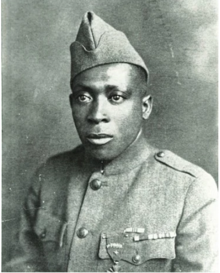Henry Johnson (World War I soldier)
| Henry Johnson | |
|---|---|
 |
|
| Birth name | William Henry Johnson |
| Nickname(s) | "Black Death" |
| Born |
c. July 15, 1897 Winston-Salem, North Carolina, U.S. |
| Died | July 1, 1929 (aged 36) Washington, D.C., U.S. |
| Allegiance | |
| Service/branch |
|
| Years of service | 1917 – 1919 |
| Rank |
|
| Unit | |
| Battles/wars | World War I |
| Awards |
|
William Henry Johnson (circa July 15, 1892 – July 1, 1929), commonly known as Henry Johnson, was a United States Army soldier who performed heroically in the first African American unit of the U.S. Army to engage in combat in World War I. On watch in the Argonne Forest on May 14, 1918, he fought off a German raid in hand-to-hand combat, killing multiple German soldiers and rescuing a fellow soldier while experiencing 21 wounds, in an action that was brought to the nation's attention by coverage in the New York World and The Saturday Evening Post later that year. On June 2, 2015 he was awarded the Medal of Honor by President Barack Obama in a posthumous ceremony at the White House.
In 1918, racism against African Americans was common among white American troops and up the line within the U.S. military, while French troops welcomed them. Johnson was recognized by the French with a Croix de guerre with star and bronze palm, and was the first American soldier in World War I to receive that honor.
Johnson died, poor, in obscurity, in 1929. From 1919 on, Henry Johnson's story has been part of wider consideration of treatment of African Americans in the Great War. There was a long struggle to achieve awards for him from the U.S. military. He was finally awarded the Purple Heart in 1996. In 2002, the U.S. military awarded him the Distinguished Service Cross. Previous efforts to secure the Medal of Honor failed, but in 2015 he was honored with the award.
...
Wikipedia
